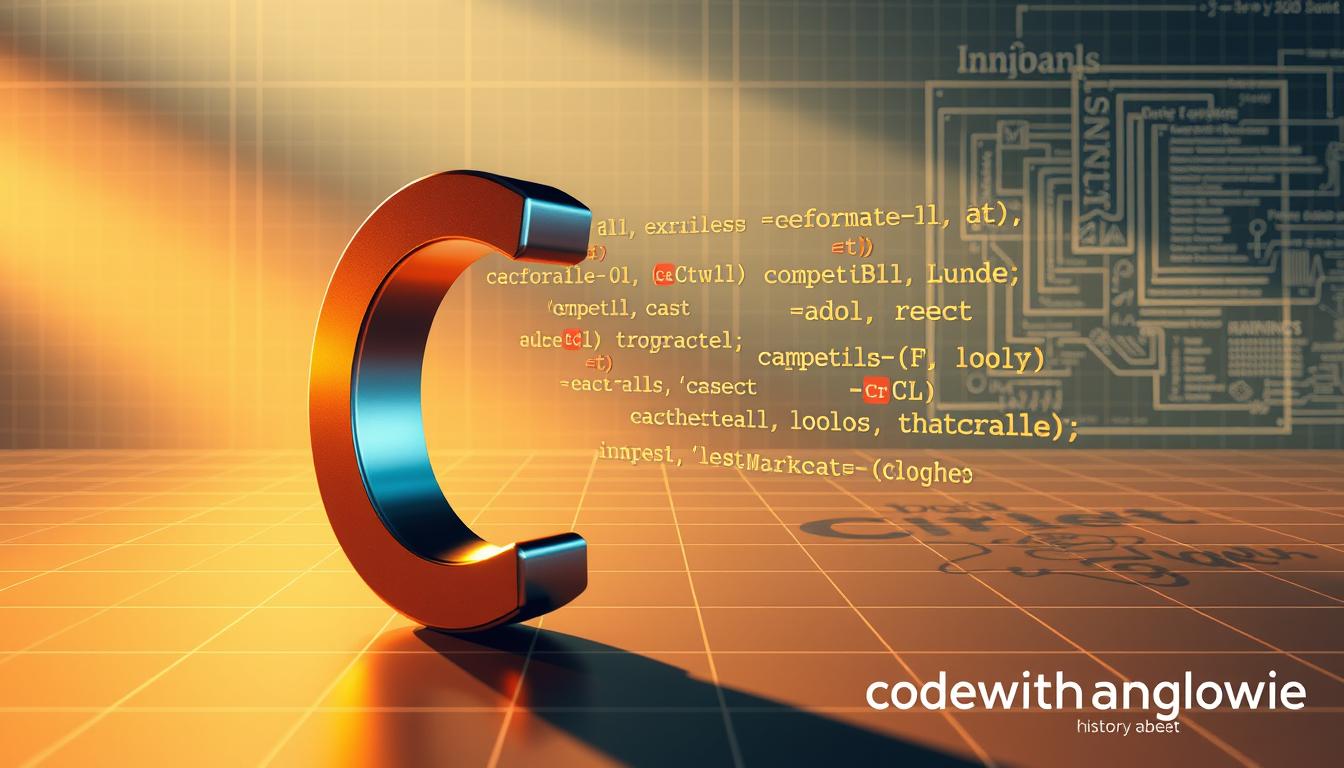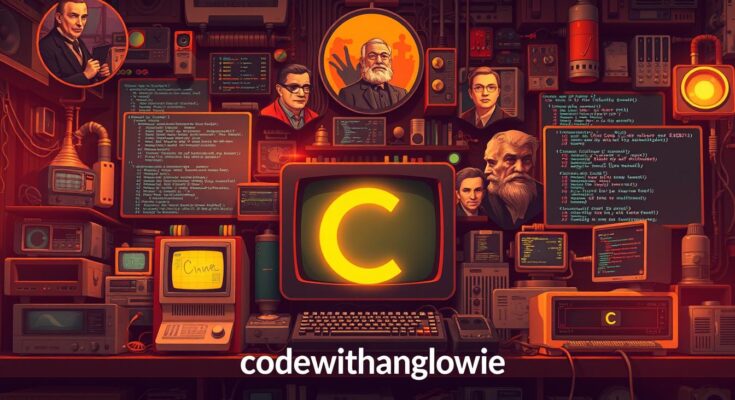Basics of C Language
“The best method to master a new programming language is through writing code in that language,” by Dennis Ritchie, who developed C. This statement emphasizes the importance of hands-on experience in mastering programming skills. For a long time, the C programming language has played a crucial role in the field of computer science. It has greatly influenced how we use technology. Knowing its basics is essential for any programmer.

As we look into the basics of C, we’ll cover its history and key concepts. These include variables, comments, constants, keywords, and data types. This knowledge will help you move on to more complex C programming topics.
Key Takeaways:
- Understanding the history and significance of C programming.
- Learning the fundamental concepts such as variables and data types.
- Grasping the importance of comments and constants in coding.
- Familiarizing yourself with keywords in C programming.
- Setting the stage for advanced C programming topics.
The Origin and Evolution of C Language
In the early 1970s, Bell Labs gave birth to the C language. This programming language would revolutionize computing. It was a major breakthrough in computer science, influenced by earlier languages and shaped by the needs of the time.
Birth at Bell Labs
Bell Labs, also known as AT&T Bell Laboratories, was AT&T’s research and development arm. This is where the C language was developed. Its creation was driven by the need for a language that was both more efficient and adaptable for Unix.
Development by Dennis Ritchie
Dennis Ritchie, a renowned American computer scientist, was instrumental in the development of the C programming language. Working at Bell Labs, Ritchie and Ken Thompson started working on Unix. C turned out to be the primary language used for developing Unix. Ritchie’s contributions to C had a significant impact on the language itself and led to its widespread use in programming communities.
Evolution from BCPL to C
The C language originated from BCPL (Basic Combined Programming Language) and B, developed by Ken Thompson. C evolved from B, adding new data types and features. Moving from BCPL to C was a significant step in programming language design. It provided a more powerful and flexible tool for programmers.
Why C Language Remains Relevant Today
For years the C language has been dominating programming. It appears in many domains, from new programming languages to systems programming.
Impact on Modern Programming Languages
These days C has had immense influence on modern programming languages. “Languages like (C++ and Java) have borrowed ideas from C. That makes it easier for people to move between these languages.
Dennis Ritchie at one point said, “The impact of C on programming is phenomenal. It continues to influence how we code today.”
C language influence
C has become something of a model language for many languages. This helps keep it relevant in the world of programming.
What C is for system programming
C is good for interfacing with hardware. It’s used to build operating systems and device drivers, as well as embedded systems.
“C is still the top choice for systems programming. It’s efficient and flexible.”
C gives a level of control and speed that’s hard to beat with other languages.
Industry Adoption and Continued Use
Industry acceptance and ongoing use
Because C is reliable and fast, the industry continues to use it. Databases, operating systems and financial apps use it all. It is a favorite because of its versatility and huge amount of existing code.
C is still necessary today, as it is clear from the effect of new languages, its function in system programming and its use in the field.
Benefits of Learning C Programming
There are many benefits to learning C programming. This helps you understand how computers work and pursue your career. This computer provides a strong foundation for understanding architecture.
Foundation for Other Languages
Starting with C programming is great for learning other languages. Languages like C ++, Java and Python . Knowing C makes it easier to learn these languages because of their similar concepts.
Understanding Computer Architecture
C Programming allows you to dive deep into computer architecture. It is important to create software that uses hardware well. You will learn how data is handled at hardware level.
“C gives you the power to control the computer at a very low level, which is essential for systems programming.” – Dennis Ritchie
Career Opportunities for C Programmers
Knowing C opens doors to many jobs in software development. C programmers are needed for operating systems, embedded systems, and more. The Bureau of Labor Statistics says software developer jobs will grow 21% by 2030.
| Career Path | Average Salary | Growth Prospects |
| Systems Programmer | $80,000 | High |
| Embedded Systems Developer | $90,000 | High |
| Software Engineer | $100,000 | Very High |
In summary, learning C programming is essential. It’s a base for other languages, improves computer understanding, and offers many career paths. Whether you’re into systems programming or software development, C is a valuable skill.

